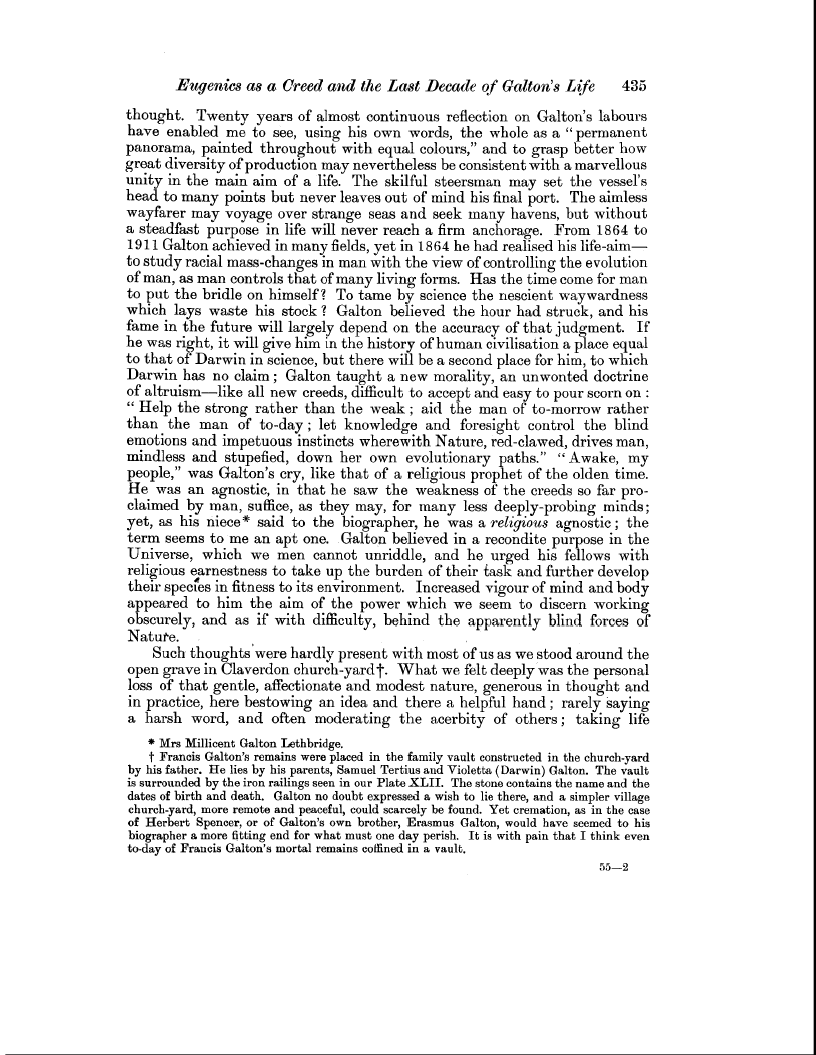| ||||||

OCR Rendition - approximate
Eugenics as a Creed and the Last Decade of Galton's Life 435 thought. Twenty years of almost continuous reflection on Galton's labours have enabled me to see, using his own words, the whole as a " permanent panorama, painted throughout with equal colours," and to grasp better how great diversity of production may nevertheless be consistent with a marvellous unity in the main aim of a life. The skilful steersman may set the vessel's head to many points but never leaves out of mind his final port. The aimless wayfarer may voyage over strange seas and seek many havens, but without a steadfast purpose in life will never reach a firm anchorage. From 1864 to 1911 Galton achieved in many fields, yet in 1864 he had realised his life-aimto study racial mass-changes in man with the view of controlling the evolution of man, as man controls that of many living forms. Has the time come for man to put the bridle on himself? To tame by science the nescient waywardness which lays waste his stock? Galton believed the hour had struck, and his fame in the future will largely depend on the accuracy of that judgment. If he was right, it will give him in the history of human civilisation a place equal to that of Darwin in science, but there will be a second place for him, to which Darwin has no claim ; Galton taught a new morality, an unwonted doctrine of altruism-like all new creeds, difficult to accept and easy to pour scorn on " Help the strong rather than the weak ; aid the man of to-morrow rather than the man of to-day ; let knowledge and foresight control the blind emotions and impetuous instincts wherewith Nature, red-clawed, drives man, mindless and stupefied, down her own evolutionary paths." "Awake, my people," was Galton's cry, like that of a religious prophet of the olden time. He was an agnostic, in that he saw the weakness of the creeds so far proclaimed by man, suffice, as they may, for many less deeply-probing minds; yet, as his niece* said to the biographer, he was a religious agnostic ; the term seems to me an apt one. Galton believed in a recondite purpose in the Universe, which we men cannot unriddle, and he urged his fellows with religious earnestness to take up the burden of their task and further develop their species in fitness to its environment. Increased vigour of mind and body appeared to him the aim of the power which we seem to discern working obscurely, and as if with difficulty, behind the apparently blind forces of Nature. Such thoughts were hardly present with most of us as we stood around the open grave in Claverdon church-yard j'. What we felt deeply was the personal loss of that gentle, affectionate and modest nature, generous in thought and in practice, here bestowing an idea and there a helpful hand ; rarely saying a harsh word, and often moderating the acerbity of others ; taking life * Mrs Millicent Galton Lethbridge. t Francis Galton's remains were placed in the family vault constructed in the church-yard by his father. He lies by his parents, Samuel Tertius and Violetta (Darwin) Galton. The vault is surrounded by the iron railings seen in our Plate XLII. The stone contains the name and the dates of birth and death. Galton no doubt expressed a wish to lie there, and a simpler village church-yard, more remote and peaceful, could scarcely be found. Yet cremation, as in the case of Herbert Spencer, or of Galton's own brother, Erasmus Galton, would have seemed to his biographer a more fitting end for what must one day perish. It is with pain that I think even to-day of Francis Galton's mortal remains eoflined in a vault. 55-2
|